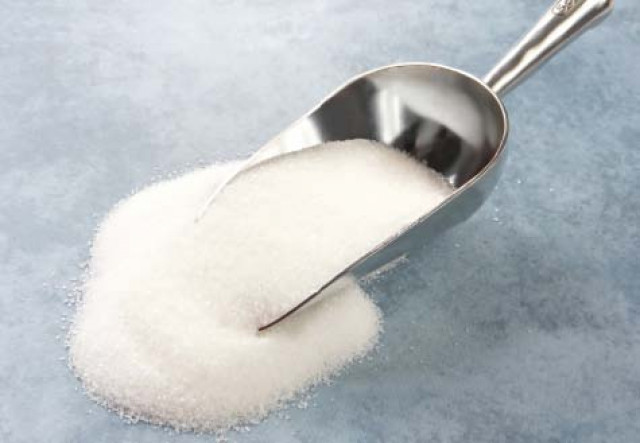Sweetener being sold at Rs190/kg, admits govt
Sweetener being sold at Rs190/kg, admits govt

The government on Friday admitted that sugar prices have mounted up to "nearly Rs190 per kilogram in most cities" of the country and it has now decided to import 500,000 metric tons of sugar to bridge the shortfall.
The admission about the rising prices was made by the Ministry of Planning, Development and Special Initiatives in a statement, which it issued after a meeting of the National Price Monitoring Committee (NPMC).
Federal Minister for Planning Ahsan Iqbal, chaired the meeting to review the inflationary trends and pricing mechanism across the country.
"Sugar prices have surged, reaching nearly Rs190 per kilogram in most cities", according to the press statement.
According to a separate inflation bulletin that the Pakistan Bureau of Statistics released on Friday, the maximum prices of sugar increased to Rs196 per kilogram in the country.
The sugar price surge is caused by the government's decision to export 765,000 metric tons of sugar on the basis of a claim that the country had surplus stocks. Before the export of sugar, the prices were Rs140 per kg, which went up by Rs56 per kg or 40% higher.
The Planning Ministry stated that the country has witnessed a decline in sugar production this year, with output falling to 5.8 million tons from 6.8 million tons. In response, the Ministry of Food has decided to import 500,000 tons of sugar to stabilize the market, it added.
The meeting was informed that prices of several essential items, including LPG, bananas, mustard oil, chickpeas, and moong dal, have decreased. During the meeting, the Chief Statistician presented key data indicating that the inflation rate for the fiscal year 2024-25 stood at 4.5%, significantly down from 23.4% recorded during the previous year.
Minister Ahsan Iqbal highlighted this as the lowest inflation rate in the past nine years, reflecting the government's effective policy interventions and improved supply-side management.
In urban areas, food inflation was recorded at 4.2%, compared to 6.2% last year. However, supply chain disruptions due to highway closures in Sindh were noted as a contributing factor in localized price fluctuations.
Minister Ahsan Iqbal emphasized the importance of effective monitoring through the Price Scorecard system. He highlighted during the meeting that the Chief Secretary of Khyber Pakhtunkhwa accessed the system 114 times, while Sindh accessed it only 10 times, Punjab 6 times, and Balochistan did not log in at all.
Among Deputy Commissioners, Islamabad logged in 27 times, Karachi 6 times, and Quetta 4 times. The Minister expressed concern over the underutilization of the Price Scorecard by provincial administrations, stated the Planning Ministry.
To improve monitoring, the Minister directed the PBS to provide login reports to chief secretaries on a monthly basis. He further directed all deputy commissioners to compare wholesale and retail prices regularly and take corrective action where necessary. Provincial governments were urged to actively supervise and support this process.
In the last meeting, the Planning Minister had directed that the Competition Commission of Pakistan would coordinate with the food ministry and provincial governments to determine fair and reasonable profit margins between wholesale & retail trade. It has been decided that the CCP will complete this task in the next three weeks and share the agreed profit margin range for vegetables, fruits & grocery items with NPMC in the next meeting.
However, the decision remained unimplemented. The CCP has informed that any form of collective price-setting mechanism including determining or endorsing a "fair and reasonable profit margins" is fundamentally inconsistent with the Commission's legal and institutional role.
It had also been decided last time that the provincial governments will strengthen their price monitoring mechanisms. A delegation of experts from PBS had visited all provinces and met the provincial stakeholders for consultations and briefing on the price monitoring system. During the meetings, de-tailed presentations were made on usage of DSSI as a data providing tool for price monitoring.
The provincial governments have also been asked again to strengthen the price monitoring system by enhancing use of the Decision Support System for Inflation (DSSI) in their jurisdiction.




















COMMENTS
Comments are moderated and generally will be posted if they are on-topic and not abusive.
For more information, please see our Comments FAQ